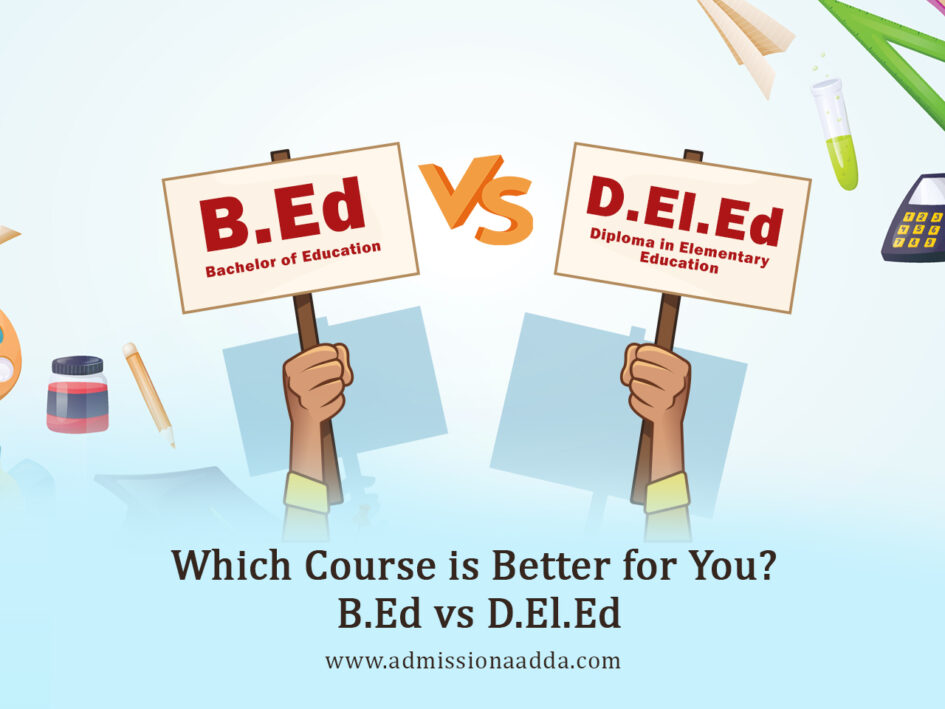Which Course is Better for You? B.Ed vs D.El.Ed
Do you remember your favorite teacher from school? That one person who inspired you and made learning feel exciting? It’s likely that, at some point in our childhood, we all dreamed of becoming just like them. Teaching is not just a job; it’s a calling. It’s one of the most respected professions because it allows us to connect with young minds and guide them toward a brighter future.
Many of us have felt that spark, wanting to make a difference in someone’s life. With the increasing need for passionate and skilled educators, more people are choosing to pursue B.Ed (Bachelor of Education) and D.El.Ed (Diploma in Elementary Education) courses. It’s exhilarating to think that you could be the one to shape a child’s future, just like that special teacher shaped yours. So, why not take that leap and inspire the next generation?
Choosing the right path for your career can feel like a daunting task, especially for those of us who dream of becoming teachers. Many aspiring educators often find themselves at a crossroads, trying to decide between a B.Ed and a D.El.Ed course. If you’re one of the 90% of students feeling overwhelmed by this decision, then you’re not alone!
We’ve all been there, staring at options and wondering which choice will lead to a fulfilling career and better opportunities. It’s easy to feel like you might waste your potential if you make the wrong decision. But fear not! You have Admission Adda with you. And in this blog you are going to understand about the differences between the B.Ed and D.El.Ed programs, at the end you are surely getting a so much clarity to your journey.
What is a B.Ed Degree?
B.Ed, or Bachelor of Education, is a two-year undergraduate program aimed at preparing teachers for secondary and higher secondary education. This course focuses on teaching methodologies, educational psychology, and subject-specific pedagogy, equipping students to excel as high school and college educators.
Key Features of the B.Ed Course
Duration: 2 years
Eligibility: Graduation in any stream
Focus: Advanced teaching methods and curriculum development
Career Scope: Secondary school teachers, educational consultants, curriculum developers, and special educators
What is D.El.Ed?
D.El.Ed, or Diploma in Elementary Education, is a two-year diploma program designed to train individuals for teaching at the elementary level (nursery to class VIII). It emphasizes child development, classroom management, and foundational teaching skills.
Key Features of the D.El.Ed Course
Duration: 2 years
Eligibility: Completion of 10+2 (Higher Secondary)
Focus: Basic teaching methodologies and child psychology
Career Scope: Primary school teachers, child care educators, and private tutors
Differences Between B.Ed and D.El.Ed
- Course Structure
The B.Ed course is tailored for those aiming to teach older students, covering topics like curriculum design and advanced teaching methodologies. On the other hand, the D.El.Ed program focuses on nurturing the skills required to handle young learners, with a strong emphasis on child psychology and elementary teaching techniques.
- Eligibility Criteria
To enroll in a B.Ed program, you must have a bachelor’s degree in any discipline. In contrast, the D.El.Ed program requires only higher secondary education (10+2) for admission, making it accessible to students fresh out of school.
- Career Opportunities
While both programs pave the way for teaching careers, their scopes differ:
B.Ed Graduates: Can teach in secondary schools, work as curriculum developers, or become educational consultants.
D.El.Ed Graduates: Typically teach in primary schools or work as child care educators in preschools and daycare centers.
- Admission Process
Most B.Ed programs mandate clearing specific entrance exams, while D.El.Ed programs often offer direct admissions based on merit or conduct entrance exams like D.El.Ed Exams.
- Curriculum Focus
The B.Ed curriculum dives deep into teaching theories, pedagogy, and educational technology. In contrast, the D.El.Ed curriculum is more hands-on, preparing teachers to manage classrooms effectively and nurture young minds.
Career Opportunities After B.Ed and D.El.Ed
Career Opportunities After B.Ed
School Teacher: Teach secondary and higher secondary classes.
Educational Consultant: Offer guidance to educational institutions.
Curriculum Developer: Design course materials and educational content.
Special Educator: Assist children with special needs.
Career Opportunities After D.El.Ed
Elementary School Teacher: Educate children in grades 1 to 8.
Educational Administrator: Manage elementary schools or programs.
Private Tutor: Provide personalized academic support.
Child Care Educator: Work in preschools and daycare facilities.
Which Course Should You Choose?
Your decision between B.Ed and D.El.Ed should align with your career aspirations. If you aim to teach higher classes and have completed graduation, B.Ed is the ideal choice. However, if you wish to teach younger children and have completed 10+2, D.El.Ed offers a great starting point.
Both programs offer rewarding career paths and contribute significantly to the education sector. Evaluate your interests, eligibility, and long-term goals before enrolling in either course.


Leave a Reply